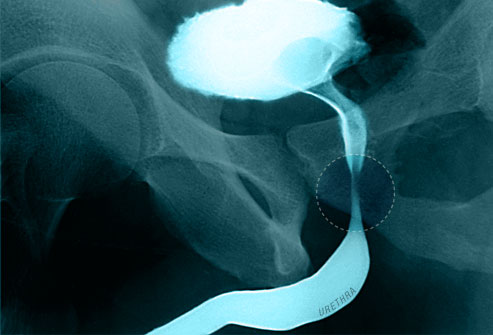Man’s hormone-dependent organ is the prostate.

The prostate is a hormone-dependent organ. Its growth is stimulated and its size and secretory function are maintained by the continued presence of serum testosterone at approximately eugonadal malelevels. Testosterone in the circulation is largely bound to proteins. Approximately 60% is bound to sex hormone-binding globulin (SHBG) and around 38% more loosely to albumin. Only 2–3% of circulating testosterone is unbound and diffuses into organs. Thereafter, it is subjected to a variety of steroid metabolic steps that regulate activity, and finally the inactivation of the steroid hormone. Over 95% of testosterone that enters the prostate is converted to 5α-dihydrotestosterone (DHT). DHT binds to the same hormone receptor as testosterone, but its biopotency is considerably higher.
Subscribe to official facebook page Canadian Pharmacy – try now.
There is an abundance of androgen receptors in the prostate, probably more than in any other tissue2. The result is that the prostate is capable of accumulating testosterone, and local concentrations of androgens are approximately ten times higher than in the circulation. In the adult prostate, androgens continuously play a role in the maintenance of the gland in the mature and differentiated state by homeostatic mechanisms that are androgen-dependent. Prostate size and plasma levels of prostate-specific antigen (PSA) are decreased in androgen-deficient men, and increase again with androgen replacement, but not significantly exceeding the size and PSA levels in age-matched controls.
In a recent study, Bhasin and colleagues6 showed that, in healthy (18–35 years old) men whose endogenous testosterone production was almost totally suppressed by administration of a luteinizing hormone-releasing hormone (LHRH) agonist, PSA levels could be restored to normal by administration of 25 mg testosterone weekly, resulting in plasma testosterone levels of 125 ng/dl (4.3 nmol/1), while the reference range of testosterone is in the order of 8–24 nmol/1. Higher doses of testosterone replacement had no additional effect on plasma PSA levels. Prostate volumes were not measured in this study. So, on the basis of androgen replacement studies and the study by Bhasin and colleagues6, there is reason to believe that there is no linear relationship between prostate volume and PSA levels on the one hand and plasma testosterone levels on the other.
In men chronically abusing anabolic-androgen steroids (body-builders), the total prostate volume was not larger whereas the central prostate volume was approximately 20% larger, compared with age-matched controls; PSA levels were not different between the two groups. Above a threshold value of plasma testosterone there seems to be no additional effect on PSA values, while only supraphysiological doses increase the central prostate volume but not the total prostate volume. In summary, the prostate is an exquisitely androgen-dependent organ, capable of accumulating testosterone through its high androgen receptor content and amplifying the action of testosterone through reduction to DHT. For treatment prostate cancer you can watch this Canadian HealthCare website.
Via these mechanisms the prostate is capable of maintaining its function with relatively low-to-normal peripheral testosterone levels, higher levels not adding substantially to its size or to PSA production. The following addresses the potential risks of administration of testosterone to androgendeficient aging men, in particular the risks for benign prostatic hyperplasia and lower urinary tract symptoms (LUTS), and associated PSA levels, but first the rationale for androgen administration to a subgroup of aging men is discussed.
« previous post
Lung Transplantation Exacerbat... A high prevalence of gastroesophageal reflux (GER) has been reported in lung transplant re...
A high prevalence of gastroesophageal reflux (GER) has been reported in lung transplant re...
next post »
My Viagra story. Ladies, pleas.... I’ve started using Viagra occasionally just a couple of years ago. And believe me, this ...
I’ve started using Viagra occasionally just a couple of years ago. And believe me, this ...
Comments are closed.